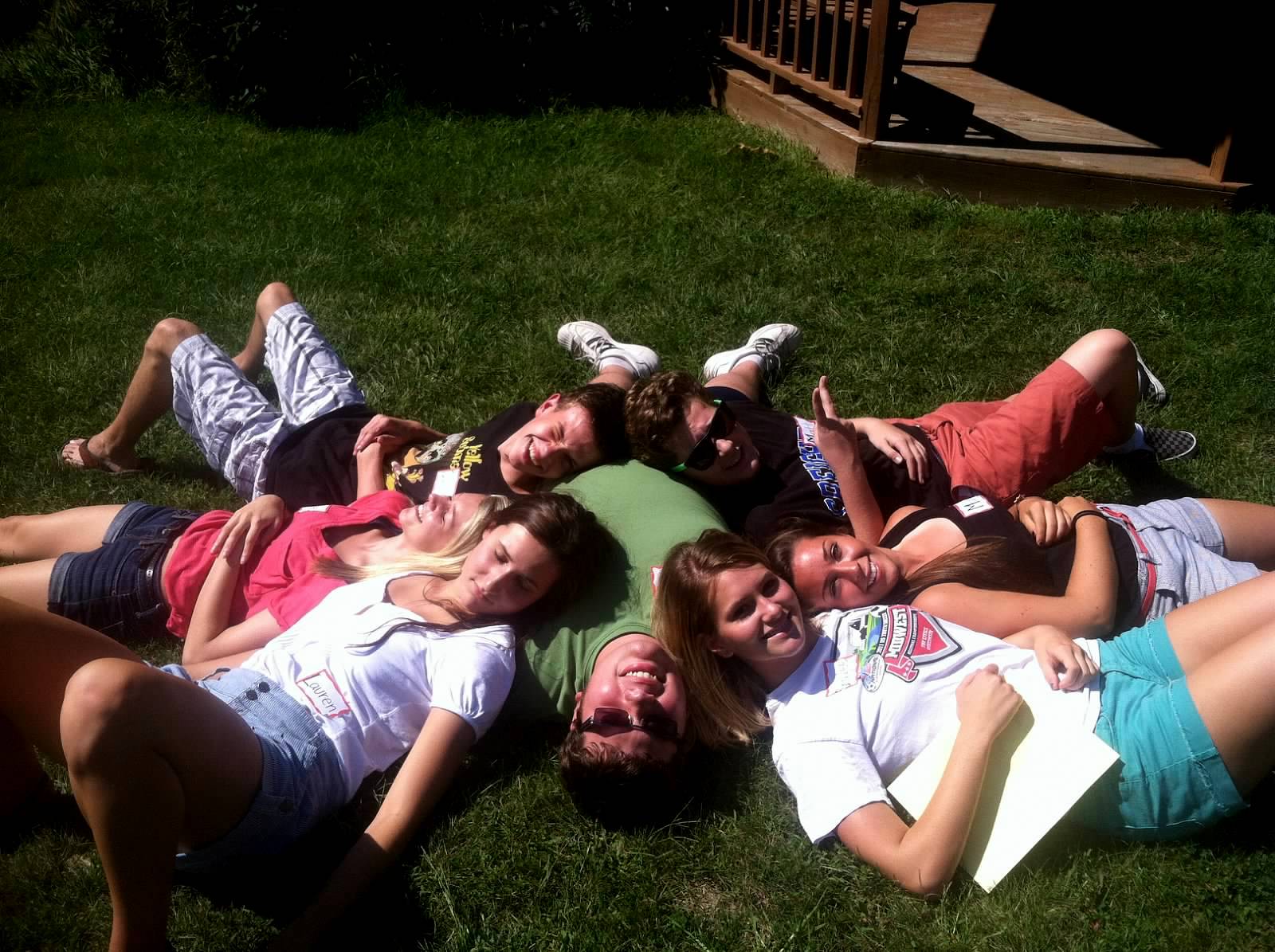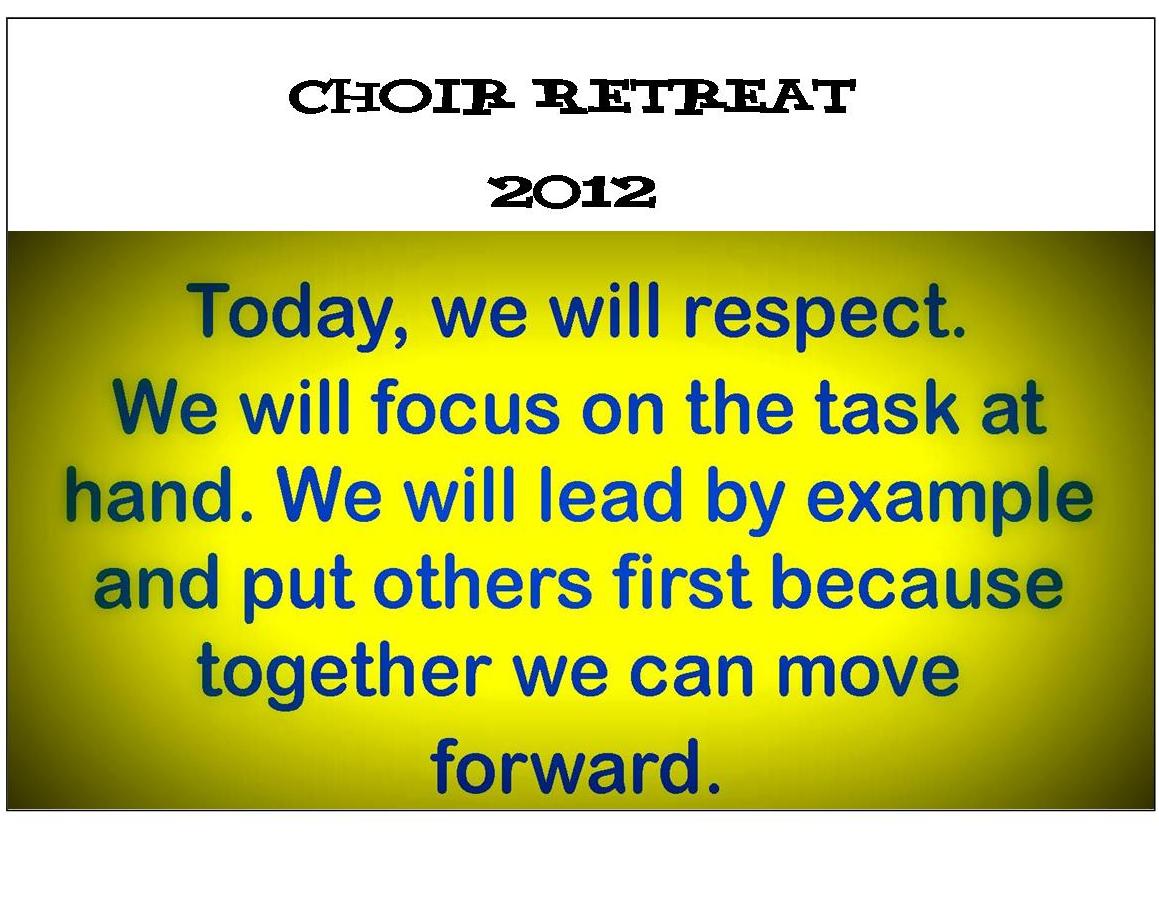The “Nuts and Bolts” of a choir retreat – Planning 101
-
As you plan a retreat, it’s important you know the purpose of this retreat. What is it you want singers to accomplish?
Do you want your singers –
*** to get a jump start on the Christmas Musical or Cantata?
*** to get a head start on the fall repertoire?
*** goal setting for the year?
*** to get to know each other better?
*** perhaps a non-singing retreat only for team building?
*** a combination of two goals?
Take time to write it down and then type it into the itinerary for the singers. It will be good for the singers to know exactly why you’ve “called them all together.” You’ll need to keep that goal in mind as you plan activities for the one day or two days you will spend together. I like to combine singing fall repertoire and teambuilding during my fall retreat.
-
Give your retreat goal a creative title to promote and entice those young adolescent singers. For example, if you want to get a head start on the Christmas repertoire or cantata, perhaps your title could be:
“DO YOU HEAR WHAT I HEAR?”
What? Isn’t that a Christmas song? Christmas in August?
“Said the Director (King) to the singers (people) everywhere; listen to what I say!”
Gathering singers everywhere! Listen to what I say,
A song, the friends, joining for the night. It will bring us goodness and light.”
And what would Christmas be without presents & lights? Christmas in August!!
Make plans for our unforgettable get-together August 14 & 15
Putting up posters in the church and sending singers this information will get everyone excited to attend. I would make sure I did a gift exchange during the retreat. More to come on that idea…!
-
Secure a retreat location about 4 or 5 months in advance. My advice is to get the singers out of town. It’s too easy for the young people to have an excuse on why they need to leave early or leave for a short period of time…”I have to pick up my brother; I forgot I have a Drs. app’t.”, etc. A church camp location is always a good idea. Church camps have lots of room and have a “retreat” feel. Most church camps have completed their in house camping schedule by this time. Make the trip no more than 30 minutes to an hour away. I always look for a camp that has several pianos so we can do sectional rehearsals. The pianos are not always in tune but at least I don’t have to haul electric pianos. I also contract for meals from the camp or you can have parents bring food. If you want to have parents help out and bring in food, put the most “go getter” and detail oriented parent in charge then get out of the way. You could also find a church in a neighboring community or a retreat center to use for your retreat depending on the day or days of the week. Once you’ve reserved your retreat space, send that info to parents so they can get it on their calendars.
-
How are you going to pay for the retreat? You’ll have to decide if you want to charge the singers a fee to cover your costs. Cost will depend on location, meals and transportation. You can use parents to drive singers to and from the site to keep costs down. For me, I’m not comfortable having students drive themselves to and from the retreat when it is out of town. The cost will also depend on whether your retreat is a one day or an overnight affair. Church budgets for next year will be completed in the spring. Can you work half of the cost of the retreat into your budget so the cost will be attractive to the students and their parents? What happens if a singer says he or she can’t attend because of cost? You’ve probably dealt with situations like that if you take your singers on tour. As I’m sure you agree, singers should never be denied participation because of cost. Brainstorming with other directors and colleagues on how to cover the cost of a retreat can be helpful.
-
Put together your posse of helpers. This should include chaperones or section leaders. If you decide to do an overnight retreat, you’ll need official chaperones. I try to use those same people to run sectional rehearsals. I’ve often used my former singers who are in college and are music majors or minors. It’s great experience for these college students to observe this aspect of education. The college kids are usually still on summer vacation so if you get to them early, they can work this into the schedule. I’ve also used colleagues and music teachers from area schools. If you plan to run sectional rehearsals then at least 2 boys and 2 girls as chaperone would be ideal. I would recommend a ratio of 1 chaperone for not more than 15 singers. I bring a team building specialist with me. What I discovered is when singers have been with me for more than 1 or 2 years, they get tired of listening to my voice (“director deafness”) so I give the singers a break and I bring in someone who is good at team building. This could be a colleague you’ve seen work with students, someone that was recommended to you or it could be a youth pastor who is a master at team building. It’s important that you meeting with all the people who will be with you during the retreat. Those people need to understand your expectations and vision for the retreat.
I’ve also had my singers participate in a challenge course as a retreat option but that’s a topic for another time.
“Music is the art which is most nigh to tears and memory.” Oscar WildeIn the next article, I will share several retreat schedules for one or two day retreats and examples of the different levels of team building. Merry Christmas!









